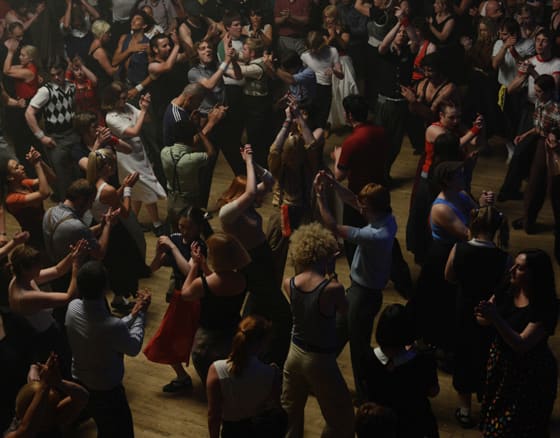Northern Soul is a fun but familiar drama about the way fans come together in music subcultures, and anyone who's ever shared a love for a rare B-side or gone crate-digging will appreciate director Elaine Constantine's portrayal of music fandom.
The film follows a formulaic rise-and-fall structure about two young men who get caught up in the UK Northern Soul scene of the 1970s, a movement that saw obscure American soul records from a few years prior to the film's 1974 setting rise in popularity with UK teens. There are comparisons to be drawn to films like 24 Hour Party People and Almost Famous, in the film's affectionate portrayal of music lovers and the allure of the scene, and while Northern Soul hits many of those same notes, Constantine keeps the film's first half quite fresh by exposing us to a music culture never portrayed on film before.
Constantine, a first time director known for her photography, frames the suffocating working-class lifestyle quite well in the film's first act, and provides some intelligent commentary about questions of race and class in the Northern Soul scene. The film comes apart in the second half though, as characters fall into rote depictions of drug addiction and hokey drama ensues. That sense of insincerity is set into harsh relief when juxtaposed with the real sense of discovery and fun in the film's early proceedings.
Anchored by strong performances from Elliot James Langridge and Joshua Whitehouse, as well as a fun early cameo by Steve Coogan, Northern Soul is effective, if not exactly revelatory, thanks to Constantine's direction and a killer soundtrack.
(levelFILM)The film follows a formulaic rise-and-fall structure about two young men who get caught up in the UK Northern Soul scene of the 1970s, a movement that saw obscure American soul records from a few years prior to the film's 1974 setting rise in popularity with UK teens. There are comparisons to be drawn to films like 24 Hour Party People and Almost Famous, in the film's affectionate portrayal of music lovers and the allure of the scene, and while Northern Soul hits many of those same notes, Constantine keeps the film's first half quite fresh by exposing us to a music culture never portrayed on film before.
Constantine, a first time director known for her photography, frames the suffocating working-class lifestyle quite well in the film's first act, and provides some intelligent commentary about questions of race and class in the Northern Soul scene. The film comes apart in the second half though, as characters fall into rote depictions of drug addiction and hokey drama ensues. That sense of insincerity is set into harsh relief when juxtaposed with the real sense of discovery and fun in the film's early proceedings.
Anchored by strong performances from Elliot James Langridge and Joshua Whitehouse, as well as a fun early cameo by Steve Coogan, Northern Soul is effective, if not exactly revelatory, thanks to Constantine's direction and a killer soundtrack.
